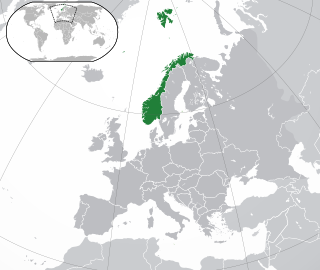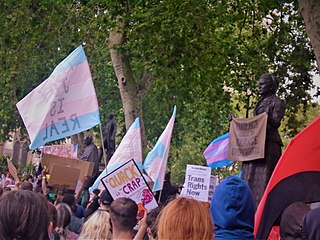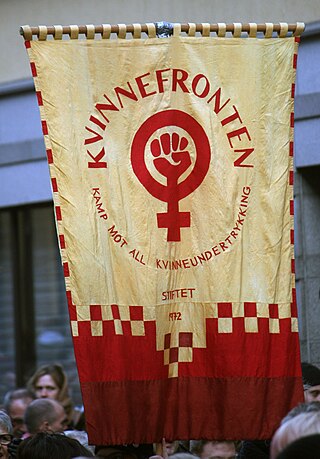Related Research Articles

Transphobia consists of negative attitudes, feelings, or actions towards transgender people or transness in general. Transphobia can include fear, aversion, hatred, violence or anger towards people who do not conform to social gender roles. Transphobia is a type of prejudice and discrimination, similar to racism, sexism, or ableism, and it is closely associated with homophobia. People of color who are transgender experience discrimination above and beyond that which can be explained as a simple combination of transphobia and racism.

Lesbian, gay, bisexual, transgender, and queer (LGBTQ) people in Norway have the same legal rights as non-LGBTQ people. In 1981, Norway became one of the first countries in the world to enact an anti-discrimination law explicitly including sexual orientation. Same-sex marriage, adoption, and assisted insemination treatments for lesbian couples have been legal since 2009. In 2016, Norway became the fourth country in Europe to pass a law allowing the change of legal sex for transgender people based on self-determination. On 1 January 2024, conversion therapy became legally banned within Norway.

Deep Green Resistance (DGR) is a radical environmental movement that perceives the existence of industrial civilization itself as the greatest threat to the natural environment, and calls for its dismantlement and a return to a pre-agricultural level of technology. Although DGR operates as an aboveground group, it calls on others to use underground and violent tactics such as attacks on infrastructure or assassination. A repeated claim in DGR literature is that acts of sabotage could cause a cascading effect and lead to the end of civilization. DGR and far-right ecofascists use similar accelerationist and anti-majoritarian tactics, seeking systemic collapse.
Feminist views on transgender topics vary widely.
The Women's Liberation Front (WoLF) is an American self-described radical feminist advocacy organization that opposes transgender rights and related legislation. It has engaged in litigation on transgender topics, working against the Obama administration's Title IX directives which defined sex discrimination to include gender identity. WoLF describes itself as radical feminist, and according to its mission statement, it wishes to "abolish regressive gender roles and the epidemic of male violence using legal arguments, policy advocacy, and public education". It has been described by news sources including The Washington Post, The Advocate, and NBC as feminist, but progressive and feminist organizations like the American Civil Liberties Union (ACLU)and the National Organization for Women (NOW) challenge this characterization, with NOW describing WoLF, alongside Women's Declaration International, as "anti-trans bigots disguised as feminists".

TERF is an acronym for trans-exclusionary radical feminist. First recorded in 2008, the term TERF was originally used to distinguish transgender-inclusive feminists from a group of radical feminists who reject the position that trans women are women, reject the inclusion of trans women in women's spaces, and oppose transgender rights legislation. Trans-inclusive feminists assert that these ideas and positions are transphobic and discriminatory towards transgender people. The use of the term TERF has since broadened to include reference to people with trans-exclusionary views who are not necessarily involved with radical feminism. In the 2020s, the term "trans-exclusionary radical feminism" is used synonymously with or overlaps with "gender-critical feminism".

Kajsa Ekis Ekman is a Swedish author, journalist, and debater. Her works have sparked debate in subjects regarding prostitution, surrogacy, transgender issues, and capitalism. She identifies as a feminist and has written a book and several articles from a gender-critical perspective,. She participated in the Swedish launch of Women's Declaration International. Until 2022 she wrote for Dagens ETC, departing amid controversy in 2022. Later in 2022 she was hired as editor of Arbetaren, but let go shortly afterwards, which generated extensive debate. Currently, she is the editor-in-chief of Parabol Press and contributes to a number of other Swedish publications. The awards she received include the Robespierre Prize in 2010 and Lenin Award in 2020.

The following outline offers an overview and guide to LGBTQ topics:

Transgender rights in the United Kingdom have varied significantly over time.

The Women's Front is a Norwegian radical feminist organization founded in 1972, and the country's oldest and largest radical feminist group. It was historically associated with the now defunct Workers' Communist Party, although its ties to the party became less pronounced during the 1980s.

The anti-gender movement is an international movement that opposes what it refers to as "gender ideology", "gender theory", or "genderism", terms which cover a variety of issues, and do not have a coherent definition. Members of the anti-gender movement are largely on the right-wing and far-right political spectrum, such as right-wing populists, social conservatives, and Christian fundamentalists. It has been linked to a shift away from liberal democracy and towards right-wing populism. Anti-gender rhetoric has seen increasing circulation in trans-exclusionary radical feminist (TERF) discourse since 2016. Different members of the anti-gender movement variously oppose some LGBT rights, some reproductive rights, government gender policies, gender equality, gender mainstreaming, and gender studies academic departments. The Canadian Security Intelligence Service has linked the anti-gender movement to the risk of "extreme violence" against the LGBTQI+ community. UN Women has described the anti-gender, gender-critical and men's rights movements as extreme anti-rights movements that "use hateful propaganda and disinformation to target and attempt to delegitimize people with diverse sexual orientations, gender identities, gender expressions, and sex characteristics."
The LGB Alliance is a British advocacy group and registered charity founded in 2019 in opposition to the policies of LGBT rights charity Stonewall on transgender issues. Its founders are Bev Jackson, Kate Harris, Allison Bailey, Malcolm Clark and Ann Sinnott. The LGB Alliance describes its objective as "asserting the right of lesbians, bisexuals and gay men to define themselves as same-sex attracted", and states that such a right is threatened by "attempts to introduce confusion between biological sex and the notion of gender". The group has opposed a ban on conversion therapy that includes trans people in the UK, opposed the use of puberty blockers for children, and opposed gender recognition reform.

Woman's Place UK (WPUK) is a British political advocacy group founded in 2017. The group is opposed to gender self-identification for transgender people in the UK, and has advocated restricting access to women-only spaces on the basis of "sex, not gender".
The Women's Declaration International (WDI), formerly the Women's Human Rights Campaign (WHRC), is an international advocacy organisation founded in the United Kingdom. WDI has published a Declaration on Women's Sex-Based Rights, and has developed model legislation to restrict transgender rights that has been used in state legislatures in the United States.
Gender-critical feminism, also known as trans-exclusionary radical feminism or TERFism, is an ideology or movement that opposes what it refers to as "gender ideology", the concept of gender identity and transgender rights, especially gender self-identification. Gender-critical feminists believe that sex is biological and immutable, while believing gender, including both gender identity and gender roles, to be inherently oppressive. They reject the concept of transgender identities.

FiLiA is a British gender-critical feminist charity founded in 2015 that describes itself as part of the women's liberation movement. FiLiA organizes a conference, held first in 2008 as Feminism in London, in different cities, which it now describes as the "largest annual grassroots feminist conference in Europe". FiLiA is gender-critical, and states that it supports "sex-based rights" and opposes what they refer to as "gender ideology." It has lobbied against gender recognition reform and considers gender self-identification a threat to "women's protected rights." Critics describe it as anti-transgender and transphobic. FiLiA is critical of the sex industry and as a result, it considers pornography harmful. It has campaigned on behalf of women internationally, and has held campaigns in countries such as Iran, Cyprus, and Kenya. It has been described as one of "the most important 'gender critical' groups" alongside Women's Declaration International. FiLiA has faced protests and attempted cancellations, notably in 2023 when the venue Platform attempted to cancel the conference due to alleged transphobia. In 2024 FiLiA launched the book The Women Who Wouldn't Wheesht, on what the authors describe as a campaign for "sex-based rights" by J.K. Rowling and others.
The Hands Across the Aisle Coalition (HATAC) is an organization founded in 2017 and operating primarily in the United States, known for its opposition to transgender rights. The organization aims to connect trans-exclusionary radical feminists with conservative Christian anti-LGBT groups, ostensibly "tabling [their] ideological differences" to "oppose gender identity ideology". The organization actively supports anti-LGBT groups in legislation targeting transgender rights.
The Women's Group Ottar is a Norwegian radical feminist women's organization founded in 1991. It has its historical roots in the Norwegian Marxist-Leninist movement of the 1970s and has been described as the most radical women's organization and "a final offshoot of 70s feminism". Ottar began as an offshoot of the Women's Front, and later, it splintered again, resulting in the creation of two new groups with explicitly trans-exclusionary profiles, Women's Declaration International (WDI) Norway and Kvinneaktivistene. The Women's Front described WDI as "transphobes." While mainly focused on combating pornography and prostitution from a radical feminist perspective, Ottar has also faced criticism from the Red Party, the Red Youth, LGBT+ rights groups and others for promoting or tolerating anti-trans and anti-Jewish views within its ranks, and some prominent members such as Kari Jaquesson have expressed support for trans-exclusionary radical feminism (TERF), declared themselves to be TERFs and engaged in doxxing and harassment of trans women by publishing pre-transition photos of them. Ottar has previously declared Jaquesson to be "politically solidly founded in Ottar's radical feminism." In 2024 Ottar faced strong criticism when the chair of its largest chapter referred to a Jewish woman as a "Zionist pig."
Transphobia in Norway has evolved over time. Since the late 20th century and into the early 21st century, acceptance of transgender people has greatly increased. Norway has made significant progress in transgender rights, with strong support from political parties ranging from the most left-wing to the Conservative Party. In the 2020s, Norway has seen an increase in the anti-gender movement, from both gender critical radical feminist groups and the far right. Recently, hate crimes against transgender people have increased, and several anti-trans groups campaign against transgender people. The 2024 Extremism Commission's report cited sources that pointed to "the connections between radical feminism and Christian conservatism" in relation to anti-trans activism, noting that "these are groups and individuals who use violent and dehumanizing language and are also threatening and extremely active."
The early 21st century saw a rise in and increasing organisation around anti-transgender sentiments in the United Kingdom, the most common strain being that of gender-critical feminism. This has led to some referring to the United Kingdom by the nickname "TERF Island".
References
- 1 2 Alm, E., & Engebretsen, E. L. (2020). Gender Self-identification. Lambda Nordica, 25(1), 48-56. doi : 10.34041/ln.v25.613
- 1 2 3 Lindgren, Joakim (April 8, 2019). "Öppet brev till Sveriges Kvinnolobby". National Council of Swedish Children and Youth Organisations.
- 1 2 "De lämnar Sveriges kvinnolobby i protest". sites.jmk.su.se. April 16, 2019.
- 1 2 3 Ortiz, Joel Mauricio Isabel (2019-06-09). "Hur ska vi förstå transfobin?". Ottar .
Detta ledde till stark kritik mot organisationen och till en diskussion i medier och sociala medier om transfobi
- 1 2 "Swedish feminist organizations oppose gender self-identification law". March 30, 2024 – via Le Monde.
- 1 2 "Timeline: Building a Pseudoscience Network". Combating Anti-LGBTQ+ Pseudoscience. Southern Poverty Law Center. 2023.
- 1 2 "Group dynamics and division of labor within the anti-LGBTQ+ pseudoscience network". Combating Anti-LGBTQ+ Pseudoscience. Southern Poverty Law Center. 2023.
Table 5.2: Networked Groups by Typology [...] Narrative Manipulation: [...] Women's Declaration International
- 1 2 ""Vilka står upp för kvinnors rättigheter?" | SvD Debatt". May 18, 2024 – via www.svd.se.
- ↑ Beijing Platform for Action, United Nations
- ↑ Swedish Women's Lobby, European Women's Lobby
- ↑ "Medlemsorganisationer". Sveriges Kvinnoorganisationer.
- ↑ Nilsson, Emelie (April 13, 2019). "Förtydliganden om vårt öppna brev till Sveriges Kvinnolobby". National Council of Swedish Children and Youth Organisations.
- ↑ "Vi välkomnar Women's Rights Watch som ny medlem!". Sveriges Kvinnoorganisationer.
- ↑ "Se vårt Almedalsseminarium om självidentifikation i efterhand". Sveriges Kvinnoorganisationer.
- ↑ Theilen, Jens (2024). "Intersectionality's Travels to International Human Rights Law". Michigan Journal of International Law . 45 (2).
- ↑ "There Is No Place for Anti-Trans Agendas in the UN". Association for Women's Rights in Development . Retrieved 9 February 2024.
- ↑ "Jämställdheten hotas om alla ska få bestämma sitt juridiska kön själva". GP. 2024-03-11.
- ↑ "LGBTIQ+ communities and the anti-rights pushback: 5 things to know". UN Women . Retrieved 19 June 2024.
- ↑ Meisler, Hallie (December 6, 2023). "Once and For All: This Is Why We Support Trans Women and Girls in Sports". National Women's Law Center.
- ↑ "Statement of Women's Rights and Gender Justice Organizations in Support of Full and Equal Access to Participation in Athletics for Transgender People" (PDF). American Association of University Women. Archived from the original (PDF) on 2024-02-04. Retrieved 2024-04-28.
- ↑ "National Consensus Statement of Anti-Sexual Assault and Domestic Violence Organizations in Support of Full and Equal Access for the Transgender Community". National Task Force to End Sexual and Domestic Violence. Archived from the original on 2024-03-31. Retrieved 2024-04-28.
- ↑ Goldberg, Abbie E. (2024). The Sage Encyclopedia of LGBTQ+ Studies (2 ed.). SAGE Publications. ISBN 9781071891384.
In recent years, a form of feminism known as trans-exclusionary radical feminism (TERF) has contained similar cisnormative arguments to those of social conservatives, promoting vilification of people with a trans lived experience in the guise of so-called gender-critical feminism. This TERF approach has been used to promote exclusionary and discriminatory legislation, such as prohibiting equal access to public toilets and the right to be treated in accordance with one's gender in workplaces, accommodations, and public venues.
- ↑ Amery, Fran; Mondon, Aurelien (2024). "Othering, peaking, populism and moral panics: The reactionary strategies of organised transphobia". The Sociological Review. doi: 10.1177/00380261241242283 .
- ↑ "Nordiskt forum normaliserar rasism". www.aftonbladet.se. June 16, 2014.
- ↑ Vi verkar för alla kvinnors och flickors rättigheter, Sveriges Kvinnoorganisationer
- ↑ "Kvinnors och flickors rättigheter möter transperspektivet". Sveriges Kvinnoorganisationer.
- ↑ Pearce, Ruth; Erikainen, Sonja; Vincent, Ben (2020). "TERF wars: An introduction". The Sociological Review . 68 (4): 677–698. doi:10.1177/0038026120934713. hdl: 2164/18988 . S2CID 221097475.